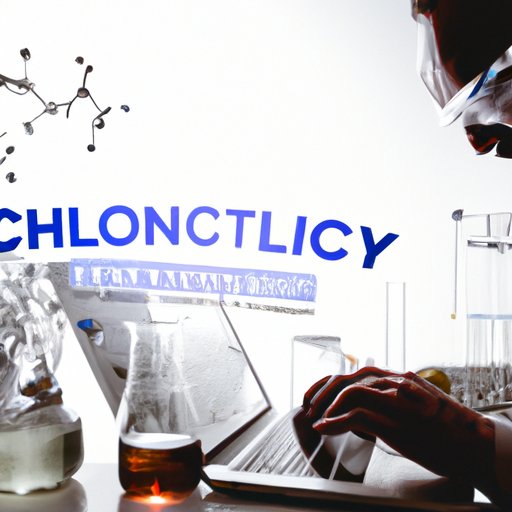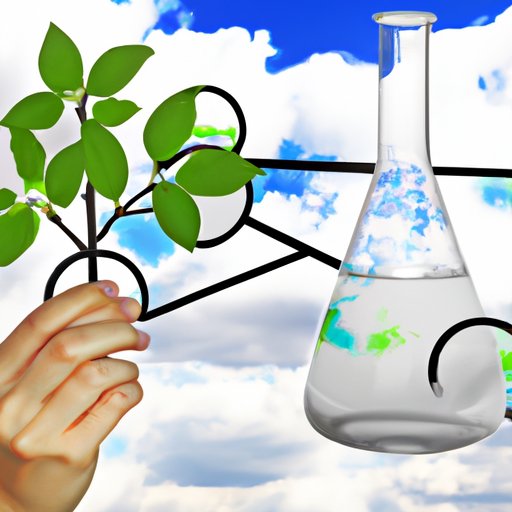Introduction
Chemistry is a branch of science that studies the composition, properties, and interactions of matter. It has been referred to as the “central science” due to its ability to connect physical, biological, and even social sciences. Chemistry plays a vital role in understanding the physical world and has a wide range of applications in our day-to-day lives.
Exploring the Interconnected Nature of Chemistry and Other Sciences
Chemistry is an interdisciplinary field that is closely related to many other sciences. For example, it is connected to physics through thermodynamics and quantum mechanics, to biology through biochemistry, and to materials science through polymers. Moreover, chemistry is essential for understanding the behavior of elements and compounds, which are important components of the physical world. As noted by Nobel laureate Roald Hoffmann, “chemistry is the central science because it bridges the gap between physics and biology.”
The interconnected nature of chemistry allows scientists to gain deeper insights into the physical world. For instance, chemists can use their understanding of the structure and reactivity of molecules to develop more efficient ways of producing energy or new materials with unique properties. In this way, chemistry serves as a powerful tool for exploring the natural world and discovering new knowledge.

Examining the Role of Chemistry in Our Everyday Lives
Chemistry plays an important role in our everyday lives. From the food we eat to the medicines we take, chemistry is involved in almost every aspect of our lives. For example, chemists have developed a wide range of synthetic materials that are used in clothing, furniture, building materials, and other consumer products. Additionally, chemists have designed processes for producing food, fuel, and medicines that are essential for sustaining life.
Moreover, chemistry has a major impact on the environment. Chemists are working to develop more sustainable processes for producing energy, as well as methods for reducing pollution and preserving natural resources. Without the advances made in chemistry, our modern society would not be able to function as it does today.

Investigating How Chemistry Drives Innovation and Technology
Chemistry is a key driver of innovation and technological progress. By studying the structure and behavior of molecules, chemists can develop new materials with unique properties that can be used to create a variety of products. For instance, chemists have developed various polymers that can be used to make lightweight and durable materials for use in automobiles and other transportation vehicles.
Furthermore, chemists have developed a wide range of catalysts that can be used to speed up chemical reactions. These catalysts can be used to produce fuels, medicines, and other materials more efficiently and cost effectively. Through their research, chemists are continuously finding new ways of using chemistry to improve the quality of life.
Analyzing the Impact of Chemistry on Human Health and Well-Being
Chemistry plays a critical role in human health and well-being. Many of the drugs and treatments used in modern medicine are based on chemistry. For example, chemists have developed a range of pharmaceuticals that can be used to treat various diseases and conditions. Additionally, chemists have developed methods for detecting and diagnosing diseases, such as cancer, more accurately and quickly.
In addition, chemists have developed a variety of materials that can be used for medical purposes. For instance, chemists have developed biodegradable polymers that can be used to repair damaged tissues or organs. Furthermore, chemists have developed materials that can be used to create prosthetic limbs and devices that can help those with disabilities lead more independent lives.

Investigating the Link Between Chemistry and Environmental Protection
Chemistry also plays a crucial role in environmental protection. For example, chemists have developed a variety of processes for cleaning and purifying water, air, and soil. Additionally, chemists have developed methods for producing energy more efficiently and with fewer emissions. Furthermore, chemists have developed a range of materials that can be used to reduce waste and conserve natural resources.
By developing these technologies, chemists are helping to protect the environment and preserve natural resources. As noted by chemist Richard Zare, “chemistry provides us with the tools to understand and protect our environment, to develop new materials and energy sources, and to improve our quality of life.”
Examining the Use of Chemistry in Solving Global Challenges
Finally, chemistry can be used to address some of the most pressing global challenges facing humanity. For instance, chemists are working to develop new materials and processes that can be used to produce food, fuel, and medicines more sustainably and efficiently. Additionally, chemists are investigating ways to use chemistry to clean up contaminated environments and reduce pollution.
Moreover, chemists are working to develop new materials that can be used to store energy or convert it into useful forms. This could help to reduce our dependence on fossil fuels and promote the development of renewable energy sources. By applying their knowledge of chemistry, chemists are helping to find solutions to global issues.
Conclusion
In conclusion, chemistry is an incredibly important science that is interconnected with many other fields. It has a wide range of applications in our everyday lives and plays a major role in driving innovation and technological progress. Additionally, chemistry plays a vital role in preserving human health and protecting the environment. Finally, chemistry can be used to solve some of the most pressing global challenges facing humanity.
As such, it is clear that chemistry is the central science and its importance cannot be overstated. By understanding its interconnected nature, we can gain deeper insights into the physical world and use chemistry to improve our lives and make the world a better place.
(Note: Is this article not meeting your expectations? Do you have knowledge or insights to share? Unlock new opportunities and expand your reach by joining our authors team. Click Registration to join us and share your expertise with our readers.)
